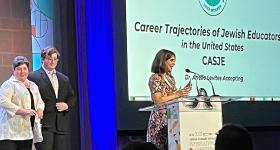Dr. Arielle Levites accepted the Ilia Salita Excellence in Research Award at the 2023 JFN Conference for CASJE's Career Trajectories of Jewish Educators Study.

It had been more than ten years since the last systematic effort to collect data about the Jewish educator workforce; in some areas of Jewish education no large-scale data have ever been collected. The CASJE Career Trajectories of Jewish Educators Study was designed to provide usable knowledge about the recruitment, retention and development of Jewish educators. Beginning July 2021, CASJE released a series of reports and briefs highlighting findings from the study.
The CASJE Career Trajectories of Jewish Educators Study was designed to provide usable knowledge about the recruitment, retention, and development of Jewish educators in the United States. The study is made up of four interlocking sub-studies: Preparing for Entry, On the Journey, Mapping the Market, and the Census, each designed to respond to one of four central research questions.
The Career Trajectories Study is organized around four central research questions:

In addition to the research reports and briefs related to the four core strands of the study, CASJE solicited a series of commentaries offering reflections on the study findings from additional researchers and practitioners. We are grateful to all those who, through generous partnership and critique, enrich this work and help us lay the groundwork for future study.
This study is animated by the belief that research-based knowledge is a critical resource in tackling complex problems in Jewish education. Insights generated through research can inform planning strategies for the field, guide philanthropic investment, and frame the design of well-conceived programmatic interventions. We welcome you to engage with these reports and briefs and join us in an ongoing conversation about their implications for practice, policy, and future research.
1
Jewish educators are mission driven, love Jewish learning, and share an abiding commitment to serving others. For many, especially those who participate in university-based pre-service programs, this sense of mission is a source of resilience in overcoming challenges they face in the field.
2
The perceived low status of Jewish educators, the perceived parochial nature of Jewish educational settings, and limited or outdated perspectives on the kinds of work Jewish educators do, are barriers to enticing entrants to careers in Jewish education.
3
Almost half of current Jewish educators report entering the field in response to a job opportunity rather than proactively choosing to enter the field; fewer than half of new educators have participated in formal pre-service preparation.
4
In many sectors of Jewish education there is no clear career ladder for educators; often the only pathway to advancement is in taking on administrative work.
5
Continuous and high-quality professional development opportunities that correlate with improved outcomes for educators are not accessible to enough Jewish educators.
6
Although Jewish educators tend to report good relationships with supervisors, mentorship and support for ongoing professional development are generally viewed as inadequate.
7
Most Jewish educators are dissatisfied with the compensation and benefits they receive. Female respondents are typically paid less than their male peers, and early childhood education lags in salary and benefits.
8
The popular narrative of a personnel crisis in Jewish education is fueled by trends in the supplementary-school labor market. Programs such as camping or social justice and innovation report a large pool of talented candidates from which to recruit educators, while day schools and early childhood programs face somewhat tougher supply-side challenges.
9
There is a lively and growing market for independent providers of professional learning, in part driven by employers who do not demand formal degree completion or certification. Independent providers generally emphasize the personal growth of the educator and relationship building skills; degree-granting university based programs emphasize professional knowledge and technical skills.
10
The number of educators enrolled in degree-granting programs has increased during the last thirty years, a trend driven by growth in specialty programs and dependent on availability of philanthropic support.
Final Report (Published 2021): Preparing for Entry is designed to understand the pathways by which people enter the field of Jewish education and identify factors that advance or inhibit launching a career in Jewish education.
White Paper (Published 2020): CASJE published the white paper Preparing for Entry: Concepts That Support a Study of What It Takes to Launch a Career in Jewish Education, which lays out the framework and key questions that underlie this inquiry and serves as a companion to this report.
Related publications and companion thought pieces:
On the Journey is designed to elucidate the career pathways of in-service Jewish educators, including their professional growth, compensation, workplace conditions and lived experiences.
Research Briefs (Published in 2021):
White Paper (Published 2019): At the outset of this entire inquiry, CASJE published a white paper titled, On the Journey: Concepts That Support a Study of the Professional Trajectories of Jewish Educators, which lays out the framework and key questions that underlie this inquiry and serves as a companion to these research briefs.
Related publications and companion thought pieces:
Final Report (Published 2021): Mapping the Market looks at the labor market for Jewish education in the United States, analyzing both supply-side and demand-side data to understand what employers look for in Jewish educators and how pre-service and professional development programs prepare educators to meet the needs of the learners and communities they serve.
Covid Supplements
As the Mapping the Market data collection effort launched, the United States entered a “shut down” period related to the Covid-19 pandemic. Given the anticipated effects on Jewish educational programs, CASJE commissioned an additional set of reports focusing on the marketplace conditions due to the pandemic.
Related publications and companion thought pieces:
The Census offers an estimation of the size and scope of the Jewish education workforce.
Overseen by CASJE, the Career Trajectories Study produced comprehensive research on the pipeline and “career arc” of educators working in Jewish education. It was supported by the William Davidson Foundation and the Jim Joseph Foundation.
The multi-year project, which yielded findings that were shared broadly with the field of Jewish education and engagement, was preceded by a Problem Formulation Convening (PFC) with educators and researchers, also supported by the William Davidson Foundation.
The PFC generated high-priority research questions and challenges relating to the professional culture in many segments of the Jewish education sector, opportunities for advancement, and the condition of educator compensation. The three questions emanating from the PFC that were central to CASJE’s project were:
The research was conducted by Rosov Consulting in three linked studies. First, researchers studied the career plans of people currently in the settings from which Jewish educators have tended to come, such as summer camps, longer-term programs in Israel, and college fellowships. The second study involved a comprehensive mapping of those who work in the field of Jewish education today to understand why they stay in the field and how they grow. The third component focused on problems faced by employers and training providers coping with personnel shortages and/or saturation.
This project, on a national scale, gathers and analyzes data about educators, where they work, and the professional preparation they receive. We hope this data brings significant value to the places at which these educators work. CASJE is committed to helping the field understand the needs of educators to recruit and retain the most talented people.
Research Award: In 2023, CASJE was honored to win the Ilia Salita Excellence in Research Award for the Career Trajectories Study. This award, funded by Genesis Philanthropy Group and awarded by the Jewish Funders Network, recognizes and highlights research projects that can impact Jewish life in a direct and positive way.
Thank You to Our Sponsors: We are deeply grateful our project sponsors, the William Davidson Foundation and the Jim Joseph Foundation, for their vision, leadership, and dedication to the proposition that research-based evidence can be a vital input to the improvement of Jewish education. Their generosity brings great promise to the ideal of linking research to practice and to making us all smarter.
For the purposes of this study Jewish educator was defined as paid professionals who work directly with people of any age who identify as Jews, in settings—whether virtual, brick-and-mortar, or outdoor—that aim to help participants find special meaning in Jewish texts, experiences, and associations (even if some who are engaged in these efforts may themselves use terms like “Jewish engagement” or “Jewish meaning making” to describe their work).
We identified five primary sectors within which these professionals work:
All studies must include parameters for inclusion and exclusion. The CASJE Career Trajectories Study does not include: rabbis who serve exclusively in pulpit positions, university professors of Jewish studies, full-time administrators and coordinators employed in Jewish educational settings who do not have direct contact with students or program participants, and volunteers. Future studies may want to look more closely at the work and contributions of these groups to Jewish education.
The ;On the Journey survey was fielded in eight communities which were selected to represent a range of sizes of Jewish populations and include diverse geographic regions of the United States. The communities were:
We revisited these eight communities for Mapping the Market to learn more about their local labor markets for Jewish educators.
The overall study was guided by a Technical Advisory Committee comprised of experts in Jewish and general education who provided input on study design, instruments, data collection and analysis. Members of this committee include:
Reports and briefs were reviewed by anonymous readers with expertise in Jewish and general education research. Additionally, each report was reviewed by the CASJE Advisory Board Stewards, Dr. Rena Dorph and Bob Sherman, as well as select CASJE Advisory Board Members.
We are especially grateful to the educational leaders who reviewed these reports and briefs. These leaders include: Rabbi Benjamin Berger, Nina Bruder, Ilisa Cappell, Yoni Colman, Jacob Cytryn, Marion Gribetz, Dr. Alisa Rubin Kurshan, Lesley Litman, Rabbi Mitch Malkus, EdD, Yafit Shriki Megidish, Nancy Parkes, Cathy Rolland, Debra Shaffer Seeman, Dana Sheanin, Shuki Taylor, Susan Wachstock, Ruthie Warshenbrot and Adam Weisberg.
CASJE will make the reports publicly available beginning in July 2021 at www.casje.org. In August CASJE will host a webinar for educational leaders with the research team from Rosov Consulting, which will be recorded and available on the CASJE website. The presentation will be followed by a series of working groups and consultations for organizational leaders at the national and metropolitan level. If your organization is interested in learning more about the study findings and the implications for your work, please contact Dr. Arielle Levites, CASJE Managing Director, alevites@gwu.edu.
The fielding period for Year 2 of the National Jewish Educator Census will close in July. Findings will be released in late Fall 2021. If your organization has not been invited to participate, please complete our contact form.
Additionally, in the Fall of 2021, CASJE will release an additional supplemental report that analyzes the effects of Covid-19 on Jewish education and a final report that synthesizes and reflects on the findings across all the study areas.

Dr. Arielle Levites accepted the Ilia Salita Excellence in Research Award at the 2023 JFN Conference for CASJE's Career Trajectories of Jewish Educators Study.

Who will teach our children and grandchildren?
Jewish education faces a crisis, a shortage of educators because of continuing trends in the overall job market, exacerbated by the pandemic.
Mapping the Marketplace through a Gender Lens
Dr. Shira Epstein discusses four themes around gender that emerged from the Career Trajectories Mapping the Marketplace study.
Dr. Gil Graff shares how CASJE's Mapping the Marketplace offers much to consider in charting paths toward deepening and expanding educators' growth.